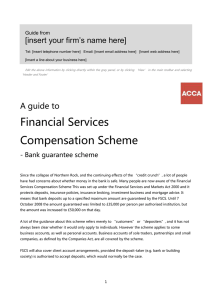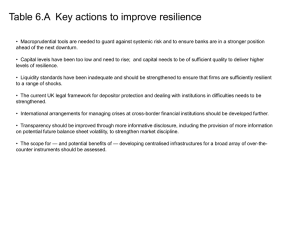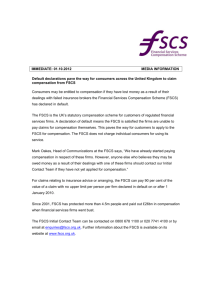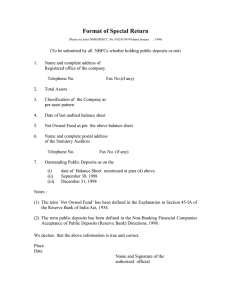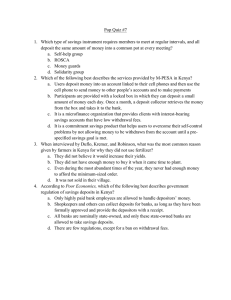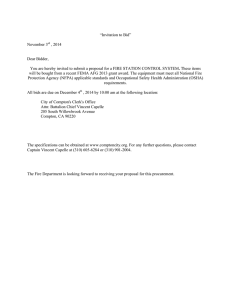ACCA Guide to... the financial services compensation scheme (for clients)
advertisement
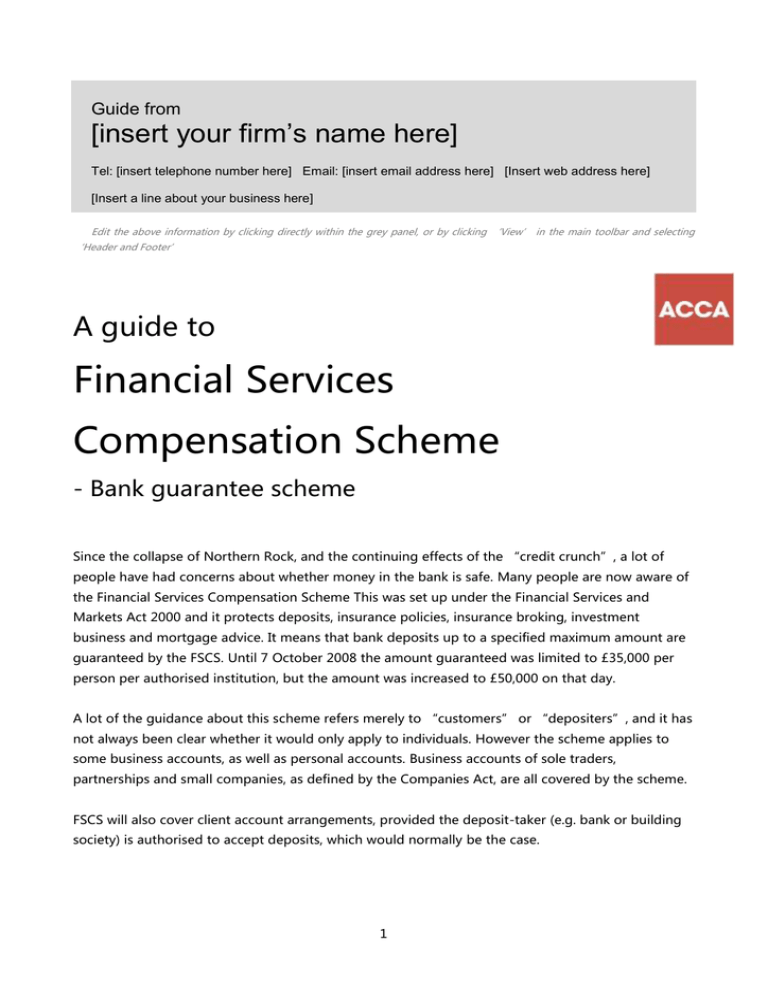
Guide from [insert your firm’s name here] Tel: [insert telephone number here] Email: [insert email address here] [Insert web address here] [Insert a line about your business here] Edit the above information by clicking directly within the grey panel, or by clicking ‘View’ in the main toolbar and selecting ‘Header and Footer’ A guide to Financial Services Compensation Scheme - Bank guarantee scheme Since the collapse of Northern Rock, and the continuing effects of the “credit crunch”, a lot of people have had concerns about whether money in the bank is safe. Many people are now aware of the Financial Services Compensation Scheme This was set up under the Financial Services and Markets Act 2000 and it protects deposits, insurance policies, insurance broking, investment business and mortgage advice. It means that bank deposits up to a specified maximum amount are guaranteed by the FSCS. Until 7 October 2008 the amount guaranteed was limited to £35,000 per person per authorised institution, but the amount was increased to £50,000 on that day. A lot of the guidance about this scheme refers merely to “customers” or “depositers”, and it has not always been clear whether it would only apply to individuals. However the scheme applies to some business accounts, as well as personal accounts. Business accounts of sole traders, partnerships and small companies, as defined by the Companies Act, are all covered by the scheme. FSCS will also cover client account arrangements, provided the deposit-taker (e.g. bank or building society) is authorised to accept deposits, which would normally be the case. 1 There is no reason to assume that any more banks will collapse, but the more risk-averse depositer may decide that it would be prudent to deposit amounts larger than £50,000 with more than one institution. If a decision is taken to spread deposits amongst different banks, it is important to establish that each bank is an “authorised institution”. If you hold multiple accounts in banks that are part of a larger group the following applies: If each of the banks is separately authorised by the Financial Services Authority FSCS would pay compensation up to the limit of £50,000 per person, per authorised institution. If each of the banks is not separately authorised but is covered by the parent company's authorisation FSCS would pay compensation up to the limit of £50,000 once, irrespective of how many different institutions a person held accounts with. 2 Of course, there is always a possibility that the £50,000 limit could be overturned and more will be successfully claimed. Additionally, a depositer may also receive a further payment, or payments, of his/her share of any money left in the failed firm. It is not possible to say in advance how much this payment will be, or when it would be received. It will depend on the rate of recoveries (also known as the dividend rate) in the liquidation of the failed bank. The liquidation process can take a long time to complete. Depositors will have to wait until the liquidator has completed the liquidation to find out how much more they might receive in total, and there is, of course, no certainty that they will receive any further payments. A few banks do offer savings accounts that are 100% guaranteed. Northern Rock, which is of course now government owned, is one of these, but it recently announced it was withdrawing some of its savings deals for new customers so as not to abuse its competitive advantage. National Savings and Investments (NS&I) also offers a 100% guarantee, but accounts may only be opened by individuals, the savings scheme is not available to corporate customers. The Anglo Irish bank has also recently seen an increase in savings account enquiries, since the Irish Government announced it would guarantee 100% of savers deposits. If investors hold money in accounts that do not have a 100% guarantee, it would be good housekeeping to be aware always of how much each account balance is. It would be prudent perhaps to transfer money between accounts so that all balances remain below £50,000. QUESTIONS AND ANSWERS I have savings in a joint account, and the balance is over £50,000. Is the £50,000 maximum per account or per person? The limit applies to each depositer, and joint accounts will be deemed to be split equally between investors unless there is evidence to the contrary. So two people with a joint account holding £100,000, will have the whole balance guaranteed. What happens if I have a mortgage or loan with the same bank as my deposit is in? The guarantee is for the net amount, so if you owe more than you have in your savings, the savings will be set against your debt and you will not receive any compensation. How long will it take for my claim to be processed? The FSCS aims to process all claims within six months of a declaration of default. Some types of claim are quicker than others, for example, for Credit Union claims. What would happen if I had an account with a UK branch of a European bank that failed? 3 The EU Deposit Guarantee Schemes Directive requires that all member states of the EEA (European Economic Area) establish a deposit guarantee scheme which gives a minimum level of protection for depositors of 20,000 Euros per eligible depositor in the event of a bank failure. Where the bank's home state scheme provides a lower limit of compensation than FSCS (i.e. less than 100% of £50,000), or the scope of protection is less than FSCS's, the bank may choose to join FSCS to 'top up' the level of protection offered by the home state scheme. Are offshore deposits covered? No there is no FCSC cover for deposits outside the European Economic Area (EEA), or in the Channel Islands or Isle of Man. Is there a helpline? Yes the FSCS helpline number is 0207 892 7300, and their website address is www.fscs.org.uk. 4 What is a small company, as defined by the Companies Act? Under section 382 Companies Act 2006 (previously section 247 Companies Act 1985), a small company must meet two of the following: Turnover not more than £6.5 million Balance Sheet total not more than £3.26 million Employees, no more than 50 5 ACCA LEGAL NOTICE This is a basic guide prepared by the ACCA UK's Technical Advisory Service for members and their clients. It should not be used as a definitive guide, since individual circumstances may vary. Specific advice should be obtained, where necessary. 6
